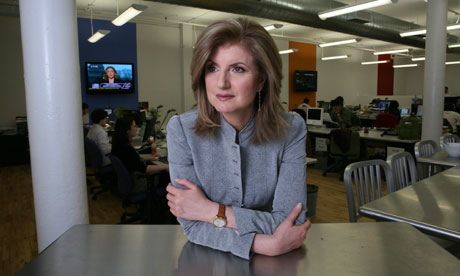Arianna Huffington: ‘I believe in little legions’
![]()
The $315m sale of the Huffington Post to AOL is a great deal for its founder – but what about the unpaid bloggers who made it a success?
Hadley Freeman

Although Arianna Huffington has achieved worldwide fame as an internet pioneer, her comfort with self-publicity turning her into the face of what may be the future of news websites, she also nurses a lifelong love for therapies that she calls “natural” and others call something else. Fire walking, homeopathy, infrared saunas – Huffington has tried them all over the years, never struggling to balance what some might see as two contrary schools of thought in her head: the hard cutting edge of new media and the fluffy airy-fairiness of New Age.
In her private office – which is almost as glossy as she is, filled with plush armchairs and an intricately carved desk – books by Andrew Weil (an advocate for vitamin supplements who has written numerous books on self healing through breathing, “energy food” and “vibrational sound”) sit happily alongside David Remnick’s tub thumper tome, The Bridge: The Life and Rise of Barack Obama. On her desk, bottles of tinctures are placed in front of a photo of her with Queen Rania of Jordan and a handwritten note inviting her to brunch, signed Russell Simmons (whose book Super Rich: A Guide to Having it All is also on Huffington’s bookcase, as though she needs any advice on that score.) Even though Christmas was two months ago, particular holiday cards linger on her window sill, including one from Joe Biden and another from a couple whose photo on the front is jarringly familiar: “Seasons greetings,” it reads inside. “Tony, Cherie and family.”
 Donna Karan (left), Sarah Brown (centre) and Arianna Huffington last year. Photograph: Andrew H. Walker/Getty Images North America
Donna Karan (left), Sarah Brown (centre) and Arianna Huffington last year. Photograph: Andrew H. Walker/Getty Images North America
In short, it is all a testament to how much Huffington’s eponymous website – on which features espousing holistic therapies run alongside political pieces about, say, John McCain or Egypt and columns by her celebrity friends, such as Nora Ephron – reflects the personality of its founder. But it’s a personality that has puzzled some by its fluidity, “a mind as flexible as her body is unwieldy”, as a 2008 profile of Huffington in the New Yorker magazine put it. Huffington has been, at various times, a self-help writer, a political pundit, an antagonist of feminists, a champion of women’s causes, a follower of the Movement of Spiritual Inner Awareness, the champion of new media, a supporter of Newt Gingrich, a fan of President Obama, a Republican and a Democrat.
Two weeks ago an announcement flashed up on the Huffington Post – paired with, as all of Huffington’s announcements on her website are, her eternally sunny likeness – that many have seen as evidence, once again, of her flexibility. The Huffington Post, the plucky little startup with a progressive bent that now has over 200 paid staff members and attracts 26 million visitors a month, had been sold to AOL for $315m. Huffington would be editor-in-chief of existing AOL websites, including Patch and TechCrunch, as well as HuffPo, as its fans know it.
Huffington, of course, presented this development as universally beneficial: “This moment will be for HuffPost like stepping off a fast moving train and onto a supersonic jet . . . 1 + 1 = 11.”
Others were more sceptical. Washington Post journalist Dana Milbank opened an article with the question, “Did Arianna Huffington just sell out her fellow progressives?” and proceeded to answer in the affirmative. Others have expressed doubt that the 9,000 registered bloggers who write for the Huffington Post for free will be willing to continue to be so self-sacrificing for AOL.
“We’re not really witnessing the demise of HuffPo, just the demise of the justifications for writing for free,” Douglas Rushkoff, contributor to the Huffington Post, recently wrote on Comment is Free.
There is also a questionable irony in Huffington pocketing a rumoured $100m from this deal, a figure she refuses to confirm or deny. Soon after the deal was announced, Huffington and the rest of her team sent an email to all of HuffPo’s content creators, emphasising that the only change they’d see would be “more people reading what you wrote”.
Furthermore, Huffington has also already stressed that the site, which was built on liberal politics, will now be “centerist”. And, in fact, it always was.
“It is consistent with what I’ve been saying for the past few years – that The Huffington Post is beyond left and right,” says Huffington, whose many self-penned books include the 2008 tract Right is Wrong. “Centerist may imply compromise, but that’s not what I mean. I mean to stop looking at every issue in American politics as left or right but to recognise how fluid things are. As a journalistic enterprise, our commitment is to pursue the truth, we’re not doing advocacy, we’re not cheerleading for any particular party, and that for me is where Huffington Post was and where we’ll continue to be.”
Does she not worry about alienating the core liberal readership?
“My question to all our readers is, does anyone think our commitment to the issues that we’ve been covering over the past year has been any less passionate?” she replies, almost fast enough to quash any objections that the question is not whether the site’s politics have changed in the past 12 months, but if they will change in the next.
Later, when I ask her again who she thinks the typical HuffPo reader is, she refers me to a colleague: “Well-educated, in a high-income household, an early adopter of technology – those are some of the key points that we like to talk about,” he replies, without mentioning political preferences.
Huffington is as glossy as a pony and indefatigable as a terrier, wearing a coffee-coloured silk blouse, blue jeans and high heels. She appears to have a Portrait of Dorian Gray deal with her young assistants because while they look harried and fret about her schedule, she – even at the end of one of the busiest weeks of her career and an hour behind schedule at midday – has not a hair out of place. The one time her brow furrows during our time together is when the question of the unpaid bloggers comes up.
“People who blog blog whenever they want – some of them blog every two years, they blog because they have ideas that they care about and they want to express them,” she says. “It’s no different from people going on TV to promote their ideas. We’re hosting people who express their ideas and if they want to write, fine, and if they don’t, fine. We get thousands of submissions so it’s not like anyone is pursuing people to write for free.”
Tim Rutten in the LA Times recently compared the Huffington Post’s business model to “a galley rowed by slaves and commanded by pirates” and said that the AOL deal “will push more journalists more deeply into the tragically expanding low-wage sector of our increasingly brutal economy.”
Huffington’s response to any allegation that she doesn’t like is a promise that her assistant will send me an article proving an alternative point of view, but duelling by article seems potentially like an argument without end. Her assistant sends me the articles that Huffington promised and all of them, sweetly, are from The Huffington Post.
Huffington also makes her usual rebuttal that the Huffington Post gives bloggers “a platform”, and that by merging with AOL this platform will be even higher. But the obvious reply to that is that these unpaid bloggers gave her a platform, too, one that elevated her from the failed gubernatorial candidate and political divorcee that she was seen as beforehand to the sought-after political pundit she is now.
Arianna Stassinopoulos was born in 1950 and grew up in Greece, with her mother Elli and her sister Agapi, to whom she is extremely close. She won a scholarship to Cambridge, where she appears to have been a predictably terrifying student and, equally predictably, fond of debates. As a contestant on a BBC quiz, at the age of 21, she met and fell in love with the man who she describes as “the love of my life”, journalist Bernard Levin, then 42. He taught her about libertarian politics and she persuaded him of the relevancy of her budding interest in spirituality, leading Christopher Hitchens to write at the time that Levin had now “achieved the total state of self-absorption towards which he had been moving for so long”.
Ten years later they broke up because of Levin’s refusal to have children and she moved to New York where she proceeded to meet, by all accounts, everyone. One of the many people who made it into her famous Rolodex was Michael Huffington, a Republican millionaire, and they married in 1986. Two daughters and 11 years later, they divorced and he has since come out as bisexual. Does he not find it odd now that his name is inextricably associated with a progressive, sorry, “centerist” website run by his ex-wife?
“He loves it!” Huffington replies in her temptingly imitable accent. “He’s a shareholder so he’s also benefited, you know.”
It was soon after the divorce that she, a conservative, began to look leftwards. She has written about this political conversion in the past and described it almost as a revelation of clarity, saying the right had “bamboozled” her. But when we meet, what was once a sharp swing is now watered down to being less than a drift. Rather, her principles stayed the same, she says – it’s the politics that let her down.
“When I was, um, a Republican, I thought the private sector would address issues like poverty and inequality, but then I saw that this wasn’t going to be done by itself. I still have a belief in the little platoons and things happening at a community level. I feel that as you get new information, it’s important to change your mind.” She proceeds to reference with smiling admiration David Cameron’s big society. This idea of “platoons” and “community levels” also, she adds, explains the business model of The Huffington Post with its legions of unpaid bloggers.
Could she imagine her political views changing again?
“I’ll send you what I wrote about it,” she sort of replies.
In 2003, Huffington ran as an independent for governor of California, ultimately losing to Arnold Schwarzenegger. After that, she started to look with heightened interest towards the internet. “I was an early fan of blogging and linking,” she says with some pride.
In 2005, she launched The Huffington Post and, particularly during the 2008 election, it became the church at which disenchanted American liberals prayed on a near daily basis. It is a smart, glossy product, if occasionally overcluttered. But for Americans who were desperate for succour after the Bush years, it was a balm, and Huffington’s achievement in making a liberal Drudge Report should not be underestimated.
Although it has some original reporting, it is known largely as a news aggregator, leading some in the mainstream media to lob accusations of the “feeder” variety. But Huffington sees this purely as a means to spread information. In 2010 she announced that HuffPo would never be behind a paywall, although, as MediaMemo’s Peter Kafka put it, seeing as much of the content on HuffPo doesn’t belong to the site, “um, how could they?”
There has been much anonymous grousing over the years that Huffington is a tough boss, even an impossible one. One editor who worked for Hunter S Thompson for three years lasted only four months under Huffington. Last year, I spent several hours with her and her staff when I rode on one of the 200 Huffington Post buses that she commandeered, at a cost of $250,000, to take people from New York to Jon Stewart’s Rally to Restore Sanity in Washington DC. No question, she looked like a hard employer, and, like her news coverage, her demands seem to be 24/7. But her staff is clearly devoted to her and I saw most of those who were at the rally in her office last week, all still muttering her name with the reverence of young prelates saying a Hail Mary.
That day on the bus showed her at her best: passionate, generous and clever about spotting the zeitgeist. But while the intensity of her passion in the moment is without question, its substantiality is possibly a different matter.
As we walk out of her office, Huffington reminisces about her early days on the web. “In 2004 I launched Arianna On Line,” she says, striding on to Broadway.
“An early precursor to AOL?” I suggest. There is a pause and then a delighted laugh. Huffington is charmed by the serendipitous acronym. “That’s wonderful!” she cries, making what looks like a “note that down for later use” glance at her assistant who scurries behind us. I consider asking for future royalties for the joke but decide against it. After all, it’s not like I’d get any money.
Related Articles
Ashraf Fayadh: Hell on Earth
![]()
There is much should concern us here as well as reminding us of the turbulent life of the Turkish communist poet Nazim Hikmet who spent most of his life either in prison or in exile
Entrevista a Orhan Pamuk
![]()
En busca de la felicidad verdadera Juan Pablo Bertazza Página 12 Orhan Pamuk es –junto con Vargas Llosa– el Nobel
“We Shall Overcome”. Pete Seeger on What Would Have Been His 100th Birthday
![]()
It was 100 years ago, May 3, that the late folk singer and activist Pete Seeger was born. In 2004, Seeger came into the Democracy Now! Watch the full interview and Democracy Now’s full archive of interviews with Seeger




